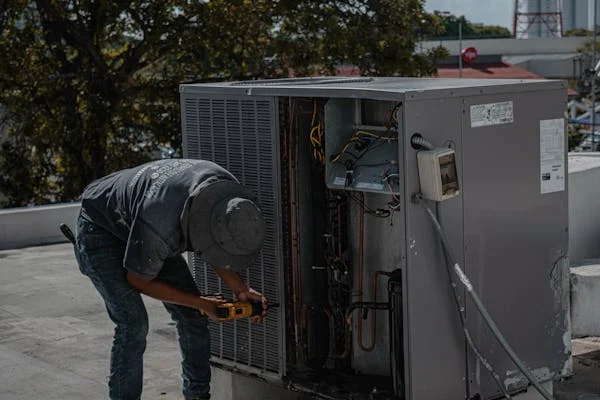Restaurant ventilation systems are essential in maintaining a safe and comfortable environment for customers and staff. Effective HVAC (heating, ventilation, and air conditioning) systems are necessary to ensure air quality, temperature regulation, and moisture control in commercial kitchens, which are often high-heat, high-humidity environments. The importance of skilled HVAC professionals cannot be overstated in properly installing, maintaining, and optimizing these systems. We will explore why HVAC professionals at Sarkinen Heating and Cooling in Vancouver are vital to the efficiency and functionality of restaurant ventilation systems, considering their impact on health, safety, energy consumption, and overall operational efficiency.
Ensuring Air Quality and Safety
Maintaining proper air quality is one of the most critical responsibilities of a restaurant’s ventilation system, and HVAC professionals are integral to ensuring this standard is met. Kitchens produce significant heat, smoke, steam, and grease, which can compromise air quality and create hazardous conditions if not properly vented. A faulty ventilation system can lead to the buildup of harmful substances like carbon monoxide, posing serious health risks to staff and patrons. HVAC professionals are trained to design, install, and maintain systems that effectively expel these contaminants from the kitchen and dining areas. They ensure sufficient airflow to clear out cooking odors, smoke, and moisture, creating a safer and more comfortable environment. Without their expertise, restaurants could face the dangers of poor air quality, putting everyone in the building at risk.
Optimizing Temperature Control and Comfort
In addition to managing air quality, HVAC professionals play a crucial role in temperature control. Commercial kitchens generate a large amount of heat, which can quickly cause uncomfortable conditions if not properly managed. Excessive heat can affect not only kitchen staff but also diners’ comfort. HVAC professionals are responsible for designing and installing systems that maintain a consistent and comfortable temperature throughout the restaurant. They ensure the kitchen is properly ventilated to remove heat while maintaining a comfortable temperature in dining areas, where guests expect a pleasant dining experience. Effective temperature control also helps prevent equipment malfunctions due to overheating, which can disrupt service. By balancing heat removal and air conditioning needs, HVAC professionals ensure the restaurant remains a safe and welcoming space for employees and customers.
Reducing Moisture and Preventing Damage
Moisture buildup is a common challenge in commercial kitchens due to cooking processes like steaming, boiling, and frying. If left unaddressed, excess moisture can lead to serious issues, including mold growth, corrosion, and structural damage to the building. HVAC professionals are key to mitigating these risks by ensuring the ventilation system includes effective humidity control mechanisms. Proper ductwork and exhaust fans can remove excess moisture from the air, preventing condensation that could damage walls, ceilings, and kitchen equipment. Additionally, they are trained to monitor and maintain humidity levels to prevent unhealthy conditions that could impact the food being prepared and the restaurant’s overall environment. With their help, restaurants can avoid costly repairs and maintain a cleaner, more hygienic kitchen.
Energy Efficiency and Cost Savings
An often-overlooked benefit of having HVAC professionals manage restaurant ventilation systems is the potential for energy savings. Poorly maintained or poorly designed systems can lead to excessive energy consumption, significantly increasing operating costs. HVAC professionals are skilled at designing energy-efficient systems that minimize energy waste. They also know how to integrate modern technologies such as variable-speed fans, heat recovery systems, and smart thermostats that help regulate the energy use of ventilation and air conditioning systems. Regular maintenance by HVAC professionals ensures the system runs efficiently, reducing the likelihood of unnecessary breakdowns and ensuring the system doesn’t consume more energy than needed. By investing in HVAC services, restaurants can lower their utility bills and reduce their environmental impact, making their operations more sustainable and cost-effective in the long term.
Compliance with Health Codes and Regulations
Restaurants are subject to strict health and safety regulations, including ventilation system requirements that help manage air quality and prevent health hazards. HVAC professionals are familiar with local codes and industry standards, ensuring that a restaurant’s ventilation system meets all necessary regulations. They are trained to design systems that comply with air quality standards, ensuring that harmful fumes, grease, and moisture are properly vented. Additionally, they stay updated on any changes to health codes and can adjust the system to remain compliant. Failure to meet these regulations can result in fines, shutdowns, or even a restaurant’s closure. By enlisting the services of HVAC professionals, restaurants can avoid these risks, ensuring they operate within legal parameters while safeguarding the health and safety of their employees and patrons.
HVAC professionals are crucial to the success of any restaurant, particularly when it comes to managing ventilation systems. Their role extends beyond installation; they are key to ensuring air quality, temperature control, moisture management, energy efficiency, compliance with health regulations, and overall kitchen performance. With their skillset and knowledge, HVAC professionals help create a safe, comfortable, and efficient environment for restaurant staff and customers. Restaurants prioritizing professional HVAC services safeguard their business against costly repairs and legal issues and foster an environment where employees can work efficiently. Customers can enjoy their dining experience without disruption.





